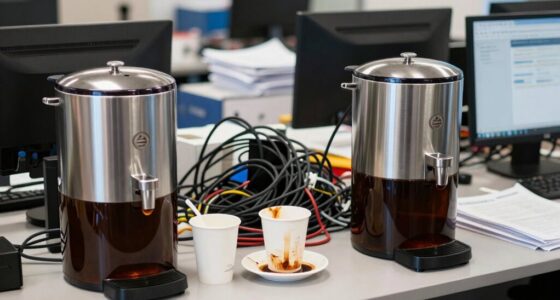To boost your focus with coffee, aim for 2 to 4 cups daily, as caffeine blocks sleep-promoting adenosine receptors in your brain, increasing alertness. Drinking coffee about 45 minutes before work or studying allows caffeine to reach peak levels, helping you stay sharp and engaged longer. But remember, moderation is key—too much can lead to jitters or crashes. Continue exploring how timing and amount impact your mental clarity for even better results.
Key Takeaways
- Caffeine in coffee blocks adenosine receptors, increasing alertness and sharpening focus.
- Consuming 2-4 cups daily can improve attention span, reaction time, and working memory.
- Drinking coffee about 45 minutes before work or study maximizes cognitive benefits.
- Effects peak within an hour and are temporary; overconsumption may cause jitters or crashes.
- Moderation and timing are key to using coffee effectively as a cognitive enhancer.

Have you ever wondered how a simple cup of coffee can boost your focus? It’s all thanks to caffeine, the primary active ingredient that enhances your concentration and mental clarity. When you drink coffee, caffeine quickly enters your bloodstream and crosses the blood-brain barrier, where it interacts with your brain’s adenosine receptors. Adenosine is a neurotransmitter that promotes sleep and relaxation.
When it binds to its receptors, it makes you feel sleepy and reduces alertness. Caffeine blocks these receptors, preventing adenosine from attaching, which results in increased wakefulness and heightened alertness. This process helps sharpen your focus and improve your ability to concentrate on tasks.
Research shows that moderate caffeine intake—about 2 to 4 cups of coffee daily—can markedly boost attention span, reaction time, and working memory. These cognitive benefits make coffee a popular choice for students and professionals aiming to enhance their mental performance.
Moderate coffee consumption (2-4 cups daily) boosts focus, reaction time, and memory, helping students and professionals perform at their best.
Drinking coffee around 45 minutes before starting a work or study session is ideal because it allows caffeine to reach peak levels in your bloodstream. During this window, you’ll experience the maximum boost in mental clarity and sustained focus, enabling you to work more efficiently and stay engaged longer.
However, it’s important to remember that the effects of caffeine on focus are temporary. Typically, peak alertness occurs within an hour of consumption and gradually diminishes as the caffeine is metabolized. To maintain steady concentration, it’s best to time your caffeine intake wisely rather than consuming large amounts all at once.
Overdoing it can lead to jitters, anxiety, or a crash once the stimulant’s effects wear off, which can hinder your cognitive performance instead of helping it. Balancing your caffeine intake is essential for ideal focus. While coffee can be a powerful tool for enhancing concentration, too much can backfire, causing discomfort and reducing your ability to focus effectively.
Listening to your body’s response and moderating your consumption ensures you reap the benefits without the downsides. When used thoughtfully, coffee becomes more than just a morning pick-me-up—it becomes a strategic aid to boost your mental clarity, sharpen your focus, and improve your overall cognitive performance during demanding tasks.
Frequently Asked Questions
Does Coffee Help With Focus and Concentration?
You’re wondering if coffee helps with focus and concentration. The answer is yes—moderate coffee intake boosts alertness by blocking adenosine in your brain, making you more awake. It also increases dopamine, which lifts your mood and motivation.
Drinking 2-4 cups daily can sharpen your focus and reaction times, especially when you’re tired. Just be careful not to overdo it, as too much caffeine can cause jitters and hinder your concentration.
Why Does Coffee Make My ADHD Better?
You wonder why coffee makes your ADHD better. When you drink coffee, caffeine blocks adenosine receptors in your brain, which boosts dopamine and norepinephrine levels.
These chemicals help improve your focus, alertness, and executive function. Because ADHD is linked to lower levels of these neurotransmitters, caffeine’s stimulation can temporarily enhance your concentration and reduce hyperactivity, making you feel more in control and focused throughout your tasks.
How to Make Coffee for Focus and Concentration?
To make coffee that boosts your focus, start with freshly ground, high-quality beans, ideally single-origin.
Use brewing methods like pour-over or AeroPress for better control over caffeine extraction.
Aim for 2-4 cups daily, about 45 minutes before work, and avoid over-brewing to prevent jitters.
If you’re sensitive, choose lighter roasts or decaf, and pair your coffee with healthy snacks to maintain alertness.
Why Does My Brain Work Better With Coffee?
Your brain works better with coffee because caffeine blocks adenosine receptors, which normally make you feel sleepy. This boosts alertness and helps you stay focused.
Coffee also stimulates dopamine production, lifting your mood and motivation. When you drink it, effects peak around 45 minutes, making your thinking sharper.
Regular intake can improve memory and pattern recognition, helping you stay sharp throughout your day.
Conclusion
So, next time you need a mental boost, consider reaching for that cup of coffee. Its caffeine can sharpen your focus and boost your productivity, helping you tackle tasks more effectively. Just remember to enjoy it in moderation to avoid jitters or crashes. With the right balance, coffee becomes a powerful tool to keep you alert and on track throughout your busy day. Cheers to staying focused and energized!









